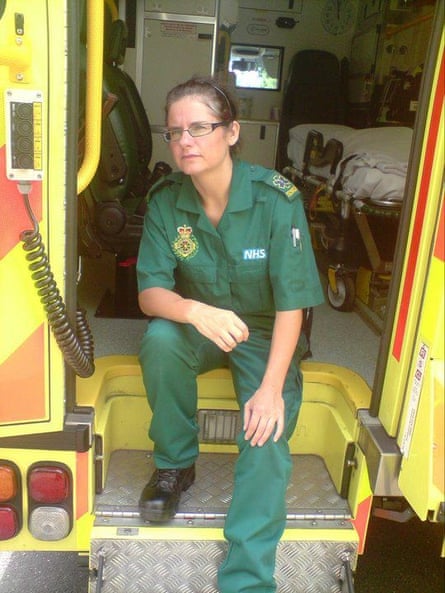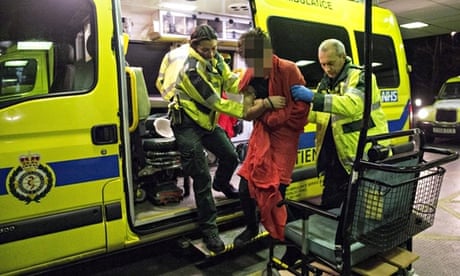Growing numbers of paramedics are going off sick with stress as the demand for 999 services increases.
Freedom of information requests submitted to NHS regional ambulance services show that both the number of paramedics on stress-related leave and the amount of time taken have increased dramatically in the last three years. Paramedics in England took a total of 41,243 days off in 2014 as a result of stress-related illnesses – up 28% since 2012.
The surge in stress leave has coincided with the NHS facing growing pressures after budgets were frozen in real terms.
Gerry Egan, a paramedic and executive director of the College of Paramedics, said: “It is clear that there are very real concerns among our membership in regards to mental ill health and many are worried that they will not reach retirement age of 68 years as a result of physical or psychological injury.”
David Davis, fellow of the College of Paramedics, said: “As a paramedic who has suffered with stress and anxiety from the effect of paramedic duties, I understand only too well how devastating the impact of mental illness is.
“It is clear that the changing environment has a part to play – in years gone by, informal counselling and peer support was a feature of every ambulance station. Such are the pressures of ever-increasing and relentless 24/7 workload and escalating complexity of paramedic practice, that consideration must now be given to developing mechanisms to support paramedics and ambulance workers inside and outside the NHS.
“Paramedic work is rewarding and humbling; but there is no doubt that the role exposes my colleagues to scenes and circumstances that most members of the public will never see in their whole lives – it is little wonder that one of the risks associated with the role is an adverse effect on individuals’ mental health.
“Addressing these issues isn’t just right at a humanitarian level – we can’t afford not to look after our paramedics.”
The biggest increase in stress was in the East Midlands, where the amount of days taken off has increased by 142%. A total of 146 paramedics took 6,536 days off for stress in the East Midlands Ambulance Service, up from 2,696 in 2012.
The West Midlands and East of England ambulance services saw slight decreases in the number of days taken off for stress-related illnesses. In the West Midlands, stress-related leave fell from 3,701 days in 2012 to 3,371 in 2014.
The figures are for nine of the 10 ambulance trusts in England, as the London Ambulance Trust did not respond to the request for information.
The situation led policy group NHS Employers to publish new guidance for managers last November about how to reduce stress and better help staff who experience it.
In 2012 and 2013, 38% of NHS personnel told the staff survey that they had suffered from stress during the previous year. Organisational change, dealing with violent and unpredictable patients and experiencing harrowing and traumatic situations are causes of stress for staff, NHS Employers says.
Trade union Unison’s national officer for ambulance members, Alan Lofthouse, said: “It is no wonder stress is such a big problem when demand for 999 services is so high and ambulance crews are sent from one traumatic job to another without any chance to reflect and recover.
“Ambulance staff do a challenging job that is physically and mentally demanding. It is the nature of working in an emergency service, but it is also clear the pressure caused by funding cuts is having an impact on workers and this needs to be addressed.
“It is unacceptable that such high levels of stress are part of normal life for ambulance staff. More people than ever are calling 999 and waits outside A&E are getting longer, adding to the problem. As a result, many are leaving the service and this has caused a recruitment and retention crisis.
“Employers can’t keep on ignoring this. We expect them to do all they can to reduce, and where possible eliminate the risks to the health and wellbeing of their workforce.”
The Department of Health said: “We know paramedics provide life-saving care, often in stressful circumstances. To support our hardworking paramedics in delivering care to patients, we recently invested an extra £50m into ambulance services, and there are 1,800 extra paramedics since May 2010.
“Well supported staff provide better care to patients, so it’s also vital ambulance trusts take ownership of workforce problems and better support staff if they run into difficulties.”

‘You take on the guilt when you lose a patient’
Michelle Sanderson, a paramedic for over 20 years in both the NHS and RAF, retired prematurely last year after suffering from post-traumatic stress disorder (PTSD).
“There was just far too much to cope with as a paramedic. Working 24-hour shifts, and seeing trauma on a daily basis. You’re on standby waiting for that radio to go off – your hyperarousal state and anxiety levels are unbelievable, and that’s before you even go on a callout.
“The things you see are just awful. I remember treating people with lungs missing. We went round someone’s house and a man was hanging from the staircase. I saw that image for a long time. I still think about that now – it never leaves you, and that was in 2009. I couldn’t talk about it with anyone.
“Straight after that we had another job – which was just a hospital transfer – so we went from an intense, horrible scene immediately to a really straightforward job. There was no outlet.
“The working conditions are difficult. At some points you don’t stop – you go from one call to the next and there is very little time for a lunch or toilet break. There was no respite. As soon as you came back from one call, you had to go out and do another. Your colleagues are in the same boat as you – you don’t want to seem weak, or be the person to let the team down.
“You get stressed, you end up with nightmares, you take on the guilt when you lose a patient. You start blaming yourself, wondering if you did enough.
“That has a knock-on effect – when you don’t sleep, you’re tired for the next shift. Then you start worrying about what other jobs are going to come in; there’s a whole host of emotions that come with the job.
“By the time you’ve finished, 12-hour shifts end up being 14 or 15 hours. Even a 10-minute break makes a difference – because otherwise we just burn out. There’s no shame in wanting or having an outlet.”
As told to Ashley Kirk











Comments (…)
Sign in or create your Guardian account to join the discussion